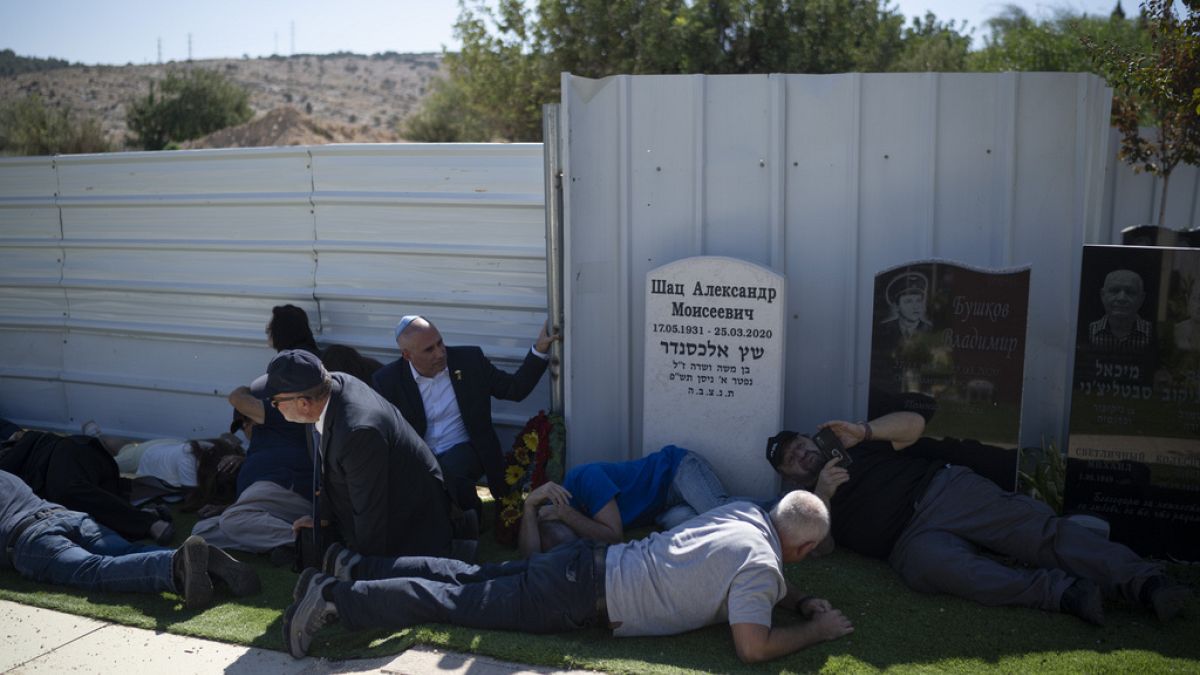On Monday, mourners attending the funeral of Alexei Poupov, an Israeli who was killed in Acre, northern Israel, had to take cover behind gravestones as rockets were launched from Lebanon into northern Israel. The situation highlights the ongoing conflict between Israel and Lebanon, with tensions escalating in recent weeks. Israeli forces have invaded southern Lebanon and have been operating along the border, targeting Hezbollah sites with airstrikes. The violence in the region has led to increased security concerns and uncertainty for residents on both sides of the border.
The funeral of Alexei Poupov turned into a terrifying ordeal as mourners were forced to seek shelter from rocket fire while paying their respects. The escalating violence in the region has led to a sense of fear and uncertainty for those living in northern Israel. The ongoing conflict between Israel and Lebanon has taken a toll on both sides, with civilians caught in the crossfire. The latest rocket attacks serve as a reminder of the fragile peace in the region and the potential for further escalation.
The situation in northern Israel highlights the complex and volatile nature of the conflict with Lebanon. The border between the two countries has been a source of tension for decades, with sporadic outbreaks of violence and conflict. The recent rocket attacks from Lebanon into northern Israel are just the latest in a long history of hostilities between the two countries. The ongoing conflict has resulted in loss of life and destruction on both sides, with no clear end in sight.
Israeli forces have responded to the rocket attacks with airstrikes targeting Hezbollah sites in Lebanon. The Israeli military has been operating in a narrow strip along the border, conducting airstrikes and carrying out operations against what they claim are Hezbollah strongholds. The airstrikes have resulted in widespread destruction in Lebanon, further escalating the conflict between the two countries. The cycle of violence and retaliation continues to perpetuate a cycle of fear and insecurity for civilians on both sides of the border.
The violence in northern Israel and southern Lebanon has raised concerns about the potential for further escalation and the impact on civilian populations. The ongoing conflict has resulted in loss of life, destruction of infrastructure, and displacement of communities on both sides of the border. The recent rocket attacks from Lebanon into northern Israel have only heightened tensions and increased security concerns in the region. The international community has called for an end to the violence and a return to dialogue to address the root causes of the conflict.
As the situation continues to unfold, the need for a peaceful resolution to the conflict between Israel and Lebanon becomes increasingly urgent. The cycle of violence and retaliation has only led to further suffering and insecurity for civilians in the region. It is crucial for both sides to engage in dialogue and work towards a lasting peace agreement that addresses the grievances and concerns of all parties involved. The international community must also play a key role in facilitating dialogue and supporting efforts to de-escalate tensions and promote reconciliation between Israel and Lebanon. Only through dialogue and diplomacy can a sustainable peace be achieved in the region.










